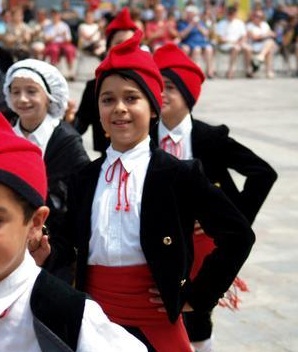Catalans
File:WIKITONGUES- Ona speaking Catalan.webm
Catalans are an ethnic group native to Catalonia, a historical and autonomous region in the northeast of Spain, with a presence also in parts of France (mainly in the department of Pyrénées-Orientales, historically known as Northern Catalonia) and Italy (in the town of Alghero in Sardinia). They speak Catalan, a Romance language, which has its own distinct literary tradition and is co-official in Catalonia alongside Spanish.
History[edit | edit source]
The history of the Catalans is deeply intertwined with the history of Catalonia itself. The region has been inhabited since prehistoric times, but the identity of the Catalans as a distinct group began to form in the Middle Ages, with the establishment of the County of Barcelona. Over the centuries, Catalonia experienced periods of prosperity and expansion, notably during the Crown of Aragon era, when Catalan merchants and sailors played a significant role in Mediterranean trade and politics.
In the modern era, Catalonia's push for greater autonomy or independence from Spain has been a central aspect of Catalan identity. The Spanish Civil War (1936-1939) and the subsequent dictatorship of Francisco Franco saw the suppression of Catalan culture, language, and autonomy, but the democratic transition after Franco's death led to the restoration of Catalonia's autonomous status and the revival of Catalan identity.
Culture[edit | edit source]
Catalan culture is rich and diverse, encompassing a wide range of traditions, festivals, and artistic contributions. The Sardana, a traditional dance, and the construction of human towers, known as castells, are iconic elements of Catalan culture. Catalonia has also produced renowned artists, such as the architect Antoni Gaudí and the painter Salvador Dalí.
Catalan cuisine is another important aspect of the region's culture, known for its combination of seafood, meats, poultry, and vegetables, reflecting the region's geographical diversity. Dishes such as pa amb tomàquet (bread with tomato) and crema catalana are traditional Catalan foods.
Language[edit | edit source]
The Catalan language is central to Catalan identity. It is a Romance language, closely related to Occitan (spoken in southern France) and more distantly to Spanish, French, and Italian. Despite periods of suppression, the language has experienced a revival and is now taught in schools and used in media and politics in Catalonia. The Catalan language also enjoys co-official status in the Balearic Islands and the Valencian Community (where it is called Valencian).
Political Status[edit | edit source]
The political status of Catalonia has been a contentious issue, with significant portions of the population advocating for greater autonomy or full independence from Spain. The 2017 Catalan independence referendum, deemed illegal by the Spanish government, led to a major political crisis and brought international attention to the Catalan independence movement. The Spanish government's response, which included the imposition of direct rule over Catalonia and the arrest of several pro-independence leaders, further polarized the situation.
Demographics[edit | edit source]
Catalans are primarily concentrated in the autonomous community of Catalonia in Spain, but there are also significant Catalan-speaking communities in the Balearic Islands, the Valencian Community, and the Pyrénées-Orientales department in France. The global Catalan diaspora has spread Catalan culture and identity to other countries, notably in Latin America and the United States.
This article is a ethnic-group stub. You can help WikiMD by expanding it!
Transform your life with W8MD's budget GLP1 injections from $125 and up biweekly
W8MD offers a medical weight loss program NYC and a clinic to lose weight in Philadelphia. Our W8MD's physician supervised medical weight loss centers in NYC provides expert medical guidance, and offers telemedicine options for convenience.
Why choose W8MD?
- Comprehensive care with FDA-approved weight loss medications including:
- loss injections in NYC both generic and brand names:
- weight loss medications including Phentermine, Qsymia, Contrave, Diethylpropion etc.
- Accept most insurances for visits or discounted self pay cost.
- Generic weight loss injections starting from just $125.00 for the starting dose
- In person weight loss NYC and telemedicine medical weight loss options in New York city available
Book Your Appointment
Start your NYC weight loss journey today at our NYC medical weight loss, and Philadelphia and visit Philadelphia medical weight loss Call (718)946-5500 for NY and 215 676 2334 for PA
Search WikiMD
Ad.Tired of being Overweight? Try W8MD's NYC physician weight loss.
Semaglutide (Ozempic / Wegovy and Tirzepatide (Mounjaro / Zepbound) available. Call 718 946 5500.
Advertise on WikiMD
|
WikiMD's Wellness Encyclopedia |
| Let Food Be Thy Medicine Medicine Thy Food - Hippocrates |
Translate this page: - East Asian
中文,
日本,
한국어,
South Asian
हिन्दी,
தமிழ்,
తెలుగు,
Urdu,
ಕನ್ನಡ,
Southeast Asian
Indonesian,
Vietnamese,
Thai,
မြန်မာဘာသာ,
বাংলা
European
español,
Deutsch,
français,
Greek,
português do Brasil,
polski,
română,
русский,
Nederlands,
norsk,
svenska,
suomi,
Italian
Middle Eastern & African
عربى,
Turkish,
Persian,
Hebrew,
Afrikaans,
isiZulu,
Kiswahili,
Other
Bulgarian,
Hungarian,
Czech,
Swedish,
മലയാളം,
मराठी,
ਪੰਜਾਬੀ,
ગુજરાતી,
Portuguese,
Ukrainian
Medical Disclaimer: WikiMD is not a substitute for professional medical advice. The information on WikiMD is provided as an information resource only, may be incorrect, outdated or misleading, and is not to be used or relied on for any diagnostic or treatment purposes. Please consult your health care provider before making any healthcare decisions or for guidance about a specific medical condition. WikiMD expressly disclaims responsibility, and shall have no liability, for any damages, loss, injury, or liability whatsoever suffered as a result of your reliance on the information contained in this site. By visiting this site you agree to the foregoing terms and conditions, which may from time to time be changed or supplemented by WikiMD. If you do not agree to the foregoing terms and conditions, you should not enter or use this site. See full disclaimer.
Credits:Most images are courtesy of Wikimedia commons, and templates, categories Wikipedia, licensed under CC BY SA or similar.
Contributors: Prab R. Tumpati, MD







